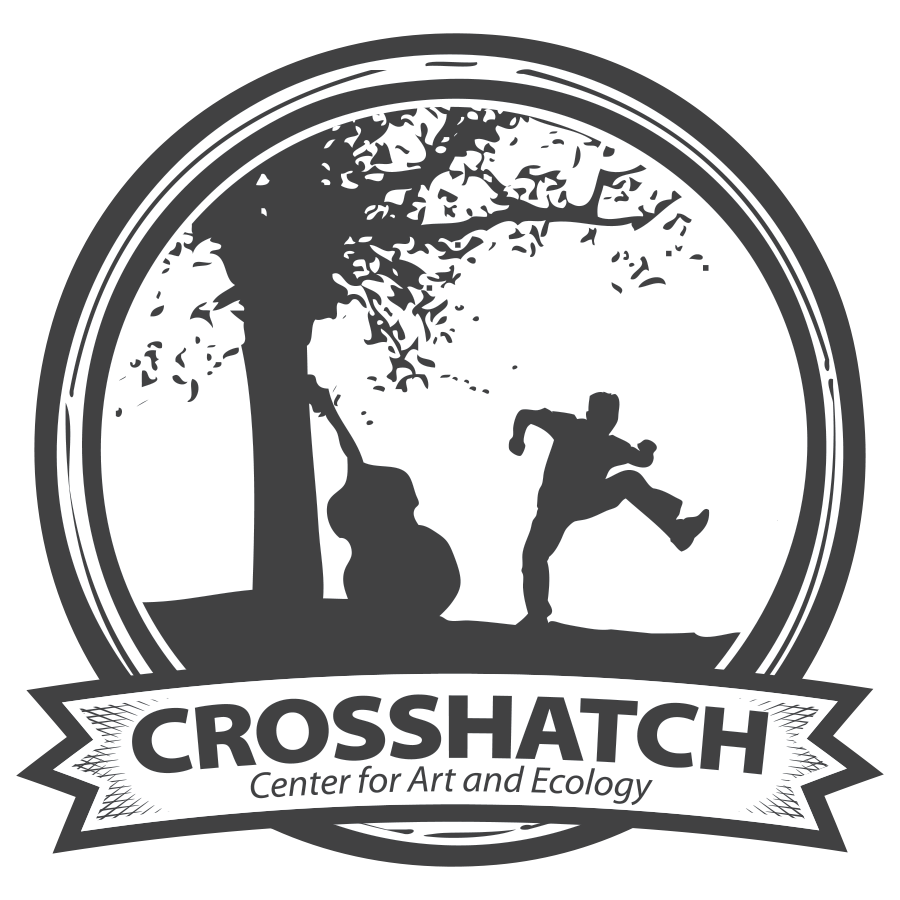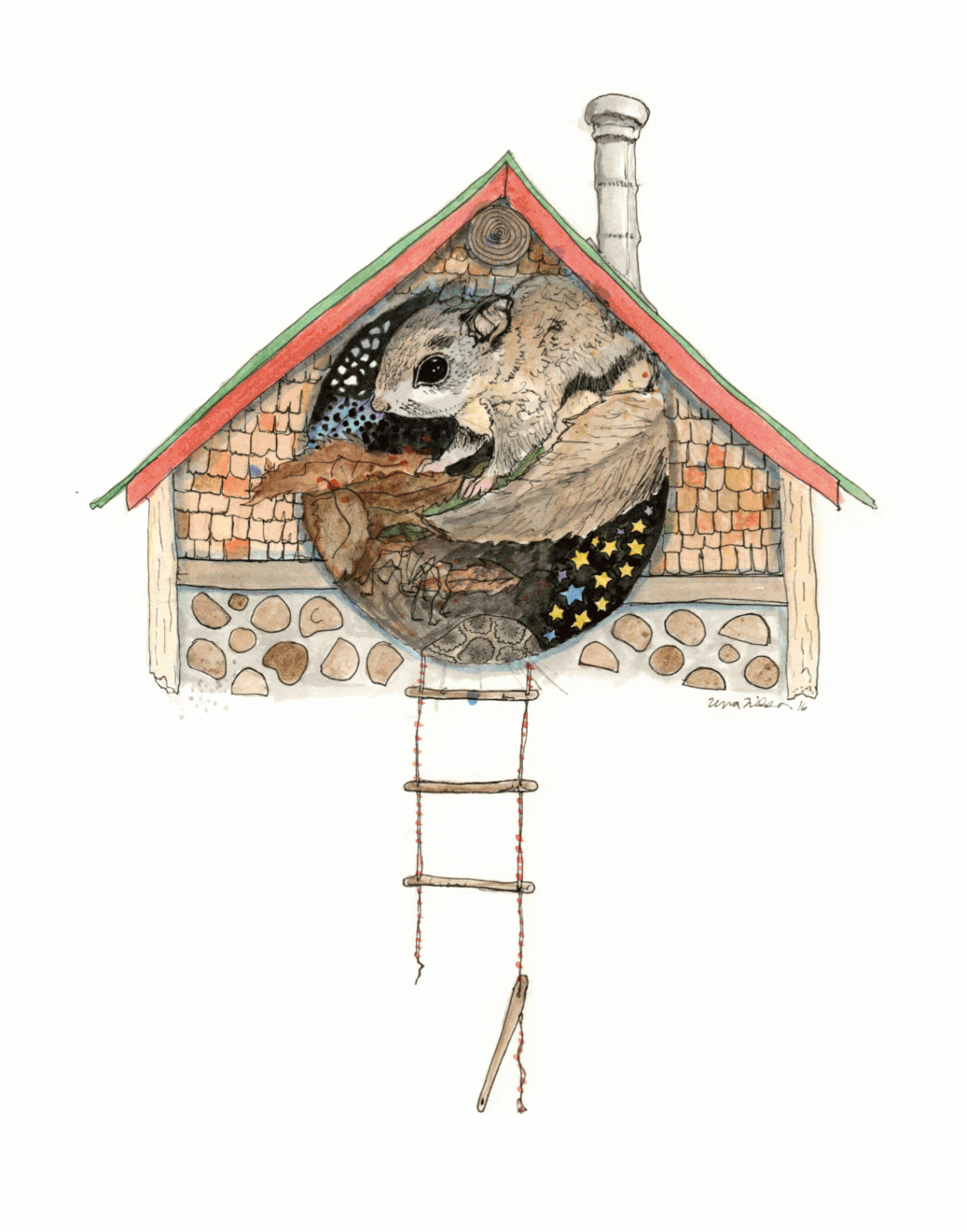Flying Squirrel Cabin, Winter Reflection, An Oath to Self • Watercolor and Archival Pen • 8"x10" • Lena Wilson
an excerpt from
The Removal of Hands
“…This idea of vacancy lives at one end of the spectrum. Land which is undeveloped, which is untouched, is meaningless and without yield. It’s waiting to be transformed into something of value. Until then, it’s nothing.
And residing on the other end of that spectrum is the opposite — land that has been developed and bears the mark of human intervention has been desecrated. It once was everything, and now it’s nothing.
I pine for a third way. And this third way doesn’t require a reinvention of the wheel. It asks simply for remembering.
If you were at the dance event in the meadow years ago, you likely were handed a folded paper program. Along with details on the evening, the dance project, dancers, and musicians, it included a short recollection of the story of the grounds where we gathered. Included in that:
“This land, like the lands and water around it, has long been inhabited by two of the three Anishinaabe nations known as the People of the Three Fires — the Ojibwe and Odawa (the Potawatami resided to the south, and along the west shore of Lake Michigan). These lands were ceded in 1836 under the Treaty of Washington, which was secretly revised after, and much more needs to be told about that, and about the other many abuses of colonial settlement, than can be said here.”
That excerpt hints at the bleak realities of the thirteen million acre land transfer from Native Americans, while the rest of the write-up points to pivotal Hatchquarters site history in 1872, 1899, and 2012. Each of those deserves their own essays, but here I want to focus on a brief phrase: “This land…has been long inhabited by…the People of the Three Fires.”
Aeonic work in land management and care made that long habitation possible. Those who tended the land understood human livelihood to be a single part of a complex cycle of actual regeneration and actual conservation of ecological cycles. Again, First Nations peoples lived on and cared for that land immemorially. The only way that longevity is possible, the only way those ties between people and place are sustained, is through wisdom, time-wrought knowledge, and hand-hewn care. The Hatchquarters location had been shaped by human hands with care, just like every place with a long memory, and that care was returned from the land in the form of food, shelter, tools, medicine, teaching, and belonging.
Recently, as we spoke while looking afield through the large window offering sight of the Hatchquarters property, I sensed anticipation in Doug and Linda’s voices. They want to see that land again shaped with care by human hands. Doug noted the autumn olive and spotted knapweed that are taking hold. I remembered seeing both, bare and blowing in the wind, on my winter snow walk months earlier. He also mentioned multi-flora rose, honeysuckle, ground hemlock, and garlic mustard, all threats to the land and soil…”
The Warp — Ideas and Inspiration
|| 1 || If you read the write-up, you might have picked up on the invisible quotation marks around the term “regeneration.” Why?
There's disagreement on what the term means.
I had been thinking about the topic because of this podcast that Daniel Marbury had sent me. Actually, it wasn’t even the podcast that spurred it initially. It was my understanding of the Regenerative Agriculture podcast itself, based on the priorities listed on their website's “About Us” section:
”You will find straightforward, actionable information about growing that can be implemented right away to increase crop quality, yields, pest resistance, and climate resilience — to regenerate soil health, and most importantly, increase farm profitability.”
I get it. Farmer’s livelihoods need to be much, much more secure. In that sense, I'm all for farm profitability. At the same time, I question whether focusing too sharply on that profits plays into the hands of industrial efficiency-minded forces that have gutted much of rural America, and laid waste to farming practices and scale conducive to regeneration and resiliency.
I listened anyway. And boy, am I glad. Will Harris’s work at White Oak Pastures is inspiring, and the critique above makes it into Episode 106: The Cumulative Benefits of Regeneration. There are deep nuances in the conversation itself, so keep that in mind and give it a spin if you like. Until then, here’s a short list of some of the topics explored:
- Why the model of regenerative farming for White Oak Pastures looks village-like in terms of diversification and includes capturing waste streams, as well as more conventional practices like cover crops and increasing organic content in the soil.
- How White Oak Pastures has shaped culture and livelihood in Clay County, Georgia, one of the poorest counties in the United States.
- Why Will is willing to embrace White Oak’s poor return on capital, relative to what most CPAs, MBAs and CFOs consider profitable, in exchange for generational, larger-picture forms of resiliency.
- Pushback against GDP analysis and putting a dollar value on living soil.
- The trouble with communicating that there are things worth doing despite their difficulty and lack of quick returns or guarantees of success.
- Why succession planning is crucial.
|| 2 || Closing the Loop with Maple Season:
The Vol. 3 No. 4 Warp mentioned “folks trying to minimize unnecessary stresses on the trees amongst seasonal abnormalities.” I wish I could have linked that to this Ellie Katz/Interlochen Public Radio write-up/audio segment, After A Mild Winter Some Tribes Aren’t Tapping Their Sugar Maples. It’s lovely, and it features Tera John of the Grand Traverse Band of Ottawa and Chippewa Indians (who’s also Jamie’s Mom.)
In the Vol. 1 No. 15 essay, What I Needed to Learn (at the Indigenous Food Sovereignty Symposium and Festival), Kevin Finney of the Great Lakes Lifeways Institute shared concerns about unfettered access to knowledge, and its lack of context and obligation as an explanation of why he won’t be making more Youtube videos. It’s been a few years since then. Here are a couple of short clips from the GLLI and Zac Earley on Anishinaabemowin sugarbush tools and terminology. They’re just teasers of sorts. If you really want to learn more, you still have to make it out into the woods.
Part one—Bezhig
Part two—Traditional Tapping
The last Whole Field (Vol. 3 No. 6 ) spanned southwest to northwest Michigan, thanks to Adrienne and Bridget’s contributions. In Sweetness and Forbearance, Michelle Berry Lane covers the same range. She begins with silver maples blooming in her front yard in Detroit. Eventually, she tracks up to the Traverse City area, where Joelle, Michelle’s niece, and her family have their own maple practices and reflections. It’s an impressive collection of story, history, culture, and ecology spanning time and much of this state. (Joelle, Jack, and family are woven into this region’s weave in various ways. If you’re wondering right now—wait, is that the Joelle and Jack that I know?—it probably is!)
The Weft — News and Events
We’re heartened by a wide-range of expressions of resilient communities and gatherings. Here’s a smattering of regional events and happenings that reflect that diversity, collected for your consideration. Choose your own adventure!
|| 1 || Marqueetown Road Tour—the 100% Made in Michigan independent film hits the road. Portraying the fascinating history of motion pictures through one iconic screen - and featuring dozens of Michigan locations and characters—Marqueetown is a true story of chasing your dreams, redefining failure and success, and reembracing the enduring magic of cinema. Find upcoming dates and venues here, or check out the trailer here.
|| 2 || The Herbal Apothecary, Growing, Foraging and Making Herbal Products, presented by Patti Travioli. Saturday, April 13th, 10am-12pm. Interlochen Public Library. Find out more here or call 231-276-6767 to pre-register.
|| 3 || Sacred Grounds Northern Michigan—Mancelona’s Au Sable Institute partners with the National Wildlife Foundation to offer free native plants and technical support for native plant gardens for houses and communities of worship (all faiths.) Applications for the program are due May 20th. Find more information and apply here.
|| 4 || Healthy & Sustainable Building Symposium. Saturday, May 11th, 9am-5pm at 414 E. Eighth Street in Traverse City. Mark your calendars now and stay tuned for more details on the day-long event offering talks and workshops on creating eco-friendly buildings.
|| 5 || Common Ground Earth Day Screening at the State Theater, Monday, April 22nd. One day only, with a Q/A panel as well. Watch the trailer here, and keep an eye out for further details.
|| 6 || The Antrim Writers Series presents: Write Here, Write Now—Reading and Book Discussion of A Study in Charlotte and Fiction Writing Workshop with Brittany Cavallaro. Elk Rapids, May 7th and 8th. Find more information at the links above.
|| 7 ||Location Revised: Antrim County Farm & Garden Info Fair: Tuesday, April 9th, 12pm-2pm, at the Antrim Conservation District Building, 4820 Stover Road, Bellaire. Join for a fun meet and greet with local goods and service providers for farmers and gardeners. Snacks and prizes, no need to register.
|| 8 || Happenings at The Alluvion Between Now and the Next Whole Field include: Big Fun, Improvisation to Sketch Teen Class, Mindful + Musical with Miriam Pico: Mini Bird, Improvisation to Sketch Teen Class, The Jeff Haas Trio featuring Laurie Sears and Lisa Flahive, Claudia Schmidt, The Insiders—A Tribute to Tom Petty, Funky Uncle, Here:Say Storytelling—Fantastic Voyage, Dar Williams, Mindful + Musical with Miriam Pico: Intergenerational Class, Jim Alfredson & The Family Business.
Find more information at www.thealluvion.org.
|| 9 || Alluvion Arts @ 414 presents Botanic, an exhibition that takes a collective look at our intimate relationship to the plant kingdom. Plants create and regulate the air we breathe, they provide us with food, medicine, textiles and building materials. Through thought provoking conceptual work, installations, botanical paintings and prints, sculptures, wood work and a freshly installed seed library, Botanic attempts to examine and honor the gifts of our botanical friends. Free and open to the public. Find more information here.
|| 10 || National Writers Series: Workshops and Classes for Students in Northern Michigan and beyond. Find information and register here for offerings like Poetry with David Hornibrook (5th-8th grade, Elk Rapids and online), and Literary Short Story with Karin Killian (9th-12th grade, at Commongrounds and online.) Classes are free, while space is limited.
|| 11 || MSU Extension’s Sustainability Speakers Series Spring 2024. Bicycle trailer food scrap collection, household food waste, effective recycling practices, and more. Find information on the upcoming virtual “lunch and learns” February through May here.
sponsored by:
Desmond Liggett Wealth Advisors is a mission-driven, fee-only wealth management company with a simple purpose: to generate exceptional value for the individuals, families, small business owners, and non-profit organizations they serve. Desmond Liggett Wealth Advisors believe in and adhere to triple-bottom-line analysis for portfolio investments, ensuring that they review how a company’s environmental and social values impact its long-term resilience and, consequently, value.
Many thanks to the Michigan Arts & Culture Council and the National Endowment for the Arts for their support of this work.
Crosshatch’s The Whole Field is a biweekly (meaning roughly every other week) human-written newsletter. We aim to provide engaging, thought-provoking content that’s worth your time. If you’ve been forwarded this email and want to receive future editions, click here to subscribe to our mailing list or view past newsletters.
We also envision this best as a collaborative work. If you have any suggestions, leads, questions or feedback, we appreciate your reply directly to this email.
Copyright (C) 2023 Crosshatch. All rights reserved.










